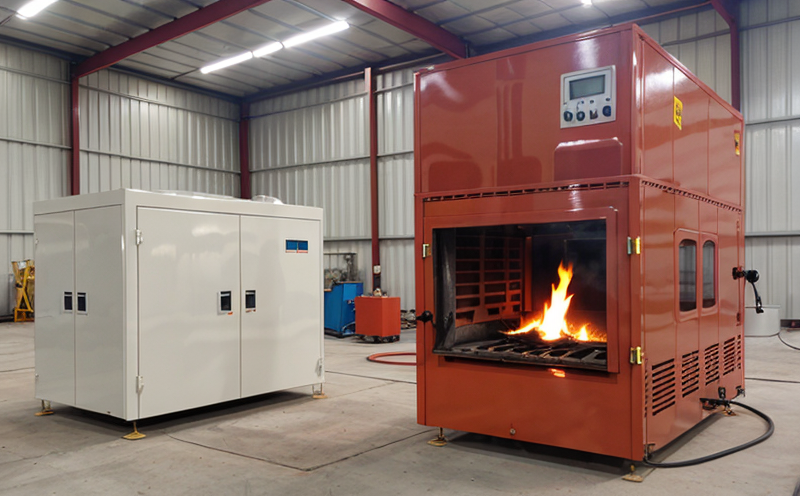ISO 11358 Thermal Decomposition of Polymers
The ISO 11358 standard provides a method for determining the thermal decomposition properties of polymers. This critical test is essential in material science and engineering, particularly when evaluating the stability and performance of polymer-based products under heat stress conditions.
Thermal decomposition refers to the breakdown of materials into simpler forms due to the application of heat. For polymers, understanding this process is crucial for predicting their behavior during processing or service life. The test described in ISO 11358 involves heating a sample at a constant rate while monitoring mass loss and temperature changes.
The primary equipment used for this testing includes thermogravimetric analysis (TGA) instruments, which can precisely measure the change in mass of a sample as it is heated. The procedure typically starts with an oven-dry sample prepared according to standard procedures. The sample is then placed into the TGA instrument where it is subjected to a controlled heating ramp.
The temperature increase is usually linear, starting from room temperature and proceeding until the polymer begins to decompose. At this point, there will be a notable decrease in mass due to the loss of volatile components such as water or small molecular fragments. The decomposition process continues until all thermally labile parts have been lost.
The data generated by this test provides valuable information on key parameters including:
- Onset temperature (Tonset): The temperature at which the mass starts to decrease due to thermal degradation.
- Decomposition temperature range: The interval between onset and peak temperatures where significant weight loss occurs.
- Residual mass retention: The percentage of original sample remaining after full decomposition.
- Differential scanning calorimetry (DSC) curves, which may be generated concurrently to provide additional insights into the thermal behavior of the polymer.
The results are reported according to ISO 11358 and can help in optimizing processing conditions, ensuring product quality, and enhancing safety. For instance, by knowing the onset temperature, manufacturers can determine how much heat their products can withstand without degrading. This knowledge is crucial for industries such as automotive, electronics, and aerospace where reliability under high temperatures is paramount.
Understanding these thermal properties also aids in predicting the lifetime of polymer-based components used in harsh environments. For example, knowing the decomposition temperature allows engineers to design systems that operate safely within specified temperature limits. Additionally, residual mass retention data can indicate how much of a given polymer will remain intact after use, impacting both recycling potential and overall product longevity.
Compliance with ISO 11358 ensures consistency in testing methodologies across different laboratories globally, which is especially important for multinational corporations or when comparing results internationally. This standardization helps avoid discrepancies that could arise from variations in test protocols used by different facilities.
Applied Standards
The ISO 11358 standard aligns closely with other international standards such as ASTM E694, EN 13078, and JIS K7211. These standards provide additional methods for thermal analysis of polymers but are not mutually exclusive. The choice between them often depends on local requirements or specific industry needs.
For instance, while ISO 11358 focuses primarily on TGA techniques, ASTM E694 also includes differential scanning calorimetry (DSC) as part of its thermal analysis suite. Similarly, EN 13078 offers broader coverage including mechanical testing alongside thermal properties.
By adhering to these standards, laboratories ensure that their practices meet international quality benchmarks and are compatible with global regulatory frameworks. This consistency is particularly beneficial for companies operating in multiple countries or engaging in collaborative research projects involving multiple stakeholders worldwide.
Quality and Reliability Assurance
Ensuring high-quality results from ISO 11358 tests requires strict adherence to laboratory protocols, meticulous sample preparation, and the use of calibrated instrumentation. Quality assurance (QA) measures include regular calibration checks for all analytical equipment involved in the testing process.
Calibration ensures that measurements taken throughout the test are accurate and reliable. This involves periodic verification against known reference standards or certified reference materials whenever possible. Additionally, QA programs should encompass training sessions for staff to stay updated on best practices and any updates to relevant international standards like ISO 11358.
The reliability of these tests is further enhanced through the implementation of robust quality control procedures. These might include duplicate testing where appropriate, internal audits, and peer reviews among colleagues within the lab. By maintaining rigorous QA measures, laboratories can provide confidence in their findings and contribute to overall product safety and performance.
Use Cases and Application Examples
- Materials Science Research: Understanding how polymers behave under varying temperatures is crucial for developing new materials with improved properties. ISO 11358 helps researchers optimize polymer structures to enhance durability or reduce weight.
- Product Development: Engineers can use this information during the design phase to ensure that newly developed products will perform reliably across expected temperature ranges without undergoing premature degradation.
- Safety Assessments: In industries where fire safety is a concern, knowing the thermal stability of polymers helps prevent accidents by ensuring components do not ignite easily or release toxic fumes when exposed to heat.
- Environmental Impact Studies: Testing for residual mass retention assists in assessing the recyclability potential of different polymer types. This knowledge informs decisions about which materials are most suitable for sustainable applications.
In practice, companies involved in manufacturing polymers or products containing them often require compliance with ISO 11358 as part of their quality assurance processes. Regulatory bodies may mandate these tests to ensure that all products meet safety and performance criteria before being released onto the market.





